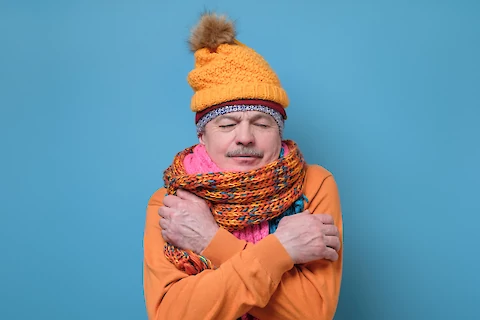
The winter season brings with it a set of unique challenges and health risks, especially for seniors. Cold-weather ailments like frostbite and hypothermia are more common than you might think, and they can significantly impact the well-being of seniors. Preventing these ailments, and being tuned into their early warning signs, is essential for maintaining optimum health throughout the colder months. This Senior Helpers blog post offers practical strategies and tips on how seniors can stay safe this winter.
Common Cold-Weather Ailments
Your body loses heat faster than it can produce it when it is exposed to cold temperatures. This can lead to various cold-related illnesses, including the following:
1. Frostbite
Frostbite is a dangerous condition that occurs when your skin freezes from exposure to cold temperatures. It often affects extremities such as the nose, ears, cheeks, fingers, and toes. Symptoms include numbness, a whitish or grayish skin appearance, and a cold or burning feeling. Severe frostbite can permanently damage underlying tissues in the body, so it is crucial for seniors to proactively decrease the potential risk of frostbite.
2. Hypothermia
Hypothermia, another grave condition, occurs when your body loses heat faster than it can produce it. It causes a dangerously low body temperature. Symptoms include shivering, fatigue, confusion, and, in severe cases, loss of consciousness. Because hypothermia affects the brain, people are often unaware they are experiencing this dangerous condition, so they are unable to take steps to stop it. It is essential to stay vigilant about these ailments to ensure timely treatment.
Dressing for the Cold
Preventing cold-weather ailments begins with dressing appropriately. Layer your clothing to create insulating air pockets that trap heat. Start with a moisture-wicking base layer to keep your skin dry, then add an insulating middle layer like fleece or wool to retain heat. Top it off with a waterproof outer layer to protect against rain, snow, and wind. Don't forget to also shield your head, hands, and feet, which are most susceptible to cold injury.
Keep Home Warm and Safe
In winter, it is also vital to maintain a warm and safe indoor environment. The indoor temperature should be at least 68°F to prevent hypothermia. However, while heating is important, it should be done safely. Avoid using stoves or ovens for heating as they can cause carbon monoxide poisoning. Make sure smoke detectors and carbon monoxide detectors are functioning properly. It is also smart to weatherize your home to conserve heat. Seal drafts around windows and doors, insulate walls and the attic, and check heating systems before the onset of winter.
Recognize the Signs of Danger
Recognizing symptoms that necessitate immediate medical attention can be lifesaving. If any symptoms of frostbite or hypothermia are noticed, including unusual shivering, fatigue, confusion, or any symptoms related to skin like numbness or color change, seek medical help immediately. Regular winter check-ups with healthcare providers can also help prevent potential health issues. If you find someone showing signs of severe hypothermia, like loss of consciousness or the absence of a pulse, call 911 right away.
Senior Helpers Can Assist During the Cold Weather Season
Senior Helpers provides comprehensive in-home senior care services throughout the year, no matter the weather. If you live in the Urbandale, Ankeny, Des Moines, or Johnston areas, contact us today at Senior Helpers Central Iowa. We are here to support you with resources and assistance to ensure you stay healthy and safe throughout the winter season.